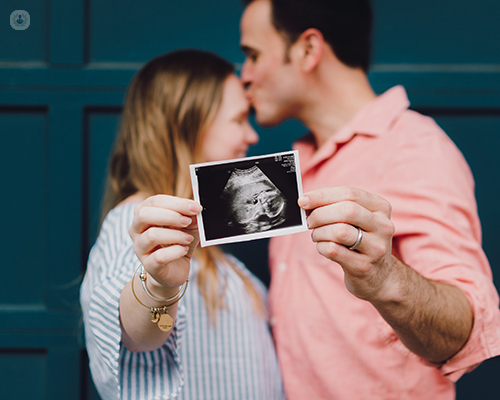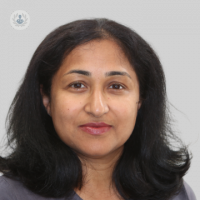An exploration of fertility: part 1
Written by:Planning a family is an exciting time for couples, as they take the next steps in their relationship. However, unfortunately, it’s not always a straightforward process and some couples struggle with fertility issues.
In the first article of a two-part series, renowned consultant obstetrician and gynaecologist Dr Katimada discusses the lifestyle factors which affect fertility, how age affects fertility and what can be done to preserve it.

What lifestyle factors affect fertility?
The fertility of a woman is affected by several modifiable and nonmodifiable factors. Reproductive capacity is achieved during the teenage years when the frontal brain is in the process of maturation. The latter can lead to risk-taking behaviour which can unfortunately impact long-term fertility. An awareness of these risks among teenagers may better equip them to make safer choices. Sexual intercourse without contraception exposes a woman to the risk of pregnancy.
Risk factors
Binge drinking not only increases risk-taking behaviour but can adversely affect any potential pregnancy. Cigarette smoking and drug use can significantly impact the ovarian reserve by increasing the loss of eggs from the ovary. Engaging in sex with multiple partners without condom use exposes a person to the risk of sexually transmitted infections and chlamydia. Gonococcus in particular can damage the fallopian tubes hence compromising fertility and increasing the risk of ectopic pregnancy in the tube.
What lifestyle measures should I make to preserve fertility?
The lifestyle measures that must begin at this early age to preserve fertility and continue thereafter include:
- Using robust contraception to avoid unplanned pregnancy.
- Using condoms in addition to contraception to protect against sexually transmitted infections.
- Alcohol in moderation not more than 1-2 units once or twice a week.
- Avoiding smoking and drug abuse.
In addition to the above:
- Maintaining a healthy BMI ie the weight-to-height ratio of 19-25 is ideal to ensure regular ovulation. A low or high BMI can produce hormonal changes that impair ovulation
- An optimal level of exercise to maintain physical and mental health. Excessive exercising can impair ovulation.
How does age affect fertility?
Women should be aware that age significantly affects female fertility more than it does in men. This is because the ovaries lose 500-800 eggs during each menstrual cycle. The ideal age for beginning childbearing depends on the desired family size. For a family of three children, it's recommended to start pregnancy at 25 years old. However, if aiming for only one child, 30-32 years old may be suitable. Yet, the increasing pressure on women to maintain financial independence can pose challenges.
It's crucial to note that fertility starts declining around 35 years old, with a sharper decline after 37. Additionally, the risk of miscarriages rises with age. After the age of 40, fertility diminishes and the risk of miscarriages and genetic defects in babies increases significantly, as do complications during pregnancy and childbirth. Women who foresee delaying childbearing may consider egg or embryo freezing to enhance their chances of conception.
Factors that may accelerate the decline in fertility include cigarette smoking, sexually transmitted infections and endometriosis. Mumps in childhood may also affect the ovarian reserve adversely.
If you are concerned about fertility and would like to book a consultation with Dr Katimada simply visit her Top Doctors profile today


